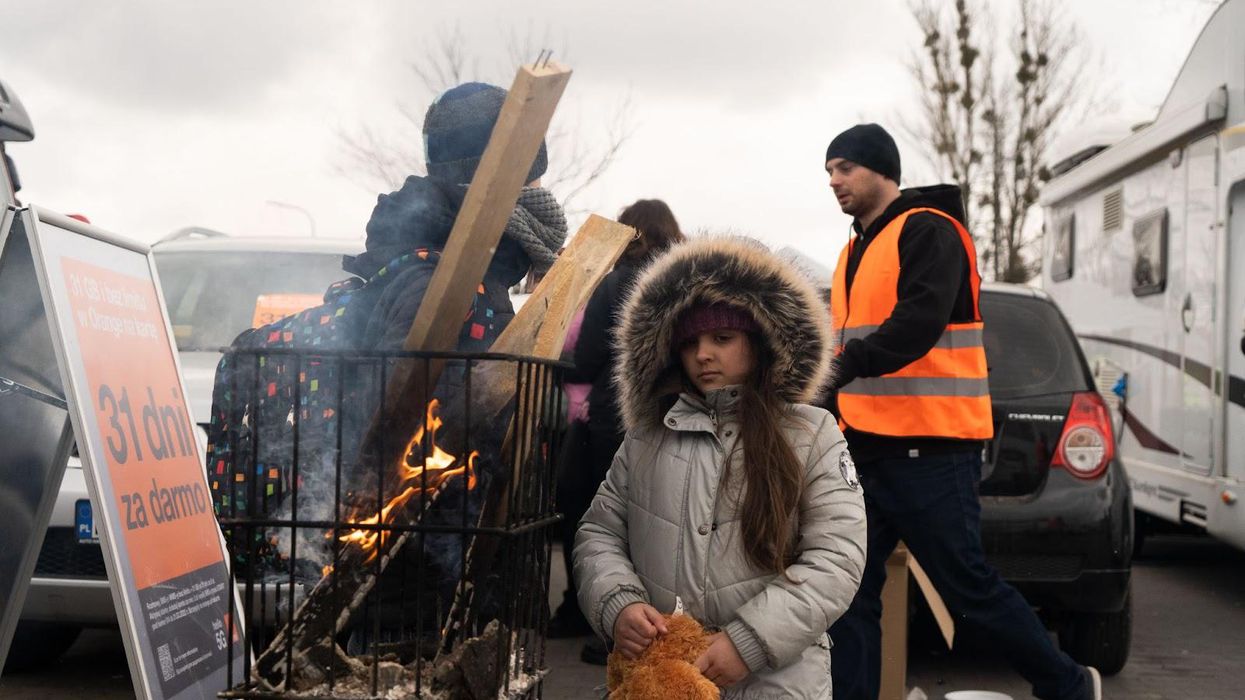
Young Ukrainian Refugee Relocates To Polish Town
Every 30 minutes another train arrives in Przemyśl, Poland, from Medyka, an otherwise obscure village wedged directly on the border with Ukraine.
With each new train, a river of refugees pours out of the doors, spilling onto a platform soon awash with women and their children and the old. Many are crying, but there is also laughter, smiles and plenty of help, especially for the elderly struggling with heavy bags. Hundreds of kids dart about at knee height.
Just 12 miles away at the border and beyond in the Ukrainian city of Lviv and countless towns and villages, families anxiously wait in the bitter March cold for a train that will let them escape war; save them from the invading Russian soldiers directing rockets, bombs and gunfire at hospitals, schools and apartment buildings. None of them knows for sure that the trains to the West are safe because Russian Vladimir Putin’s troops are raining hellfire down on so-called humanitarian escape corridors.
“Why are so many people giving us so much support?” a refugee mother of two asks.
Polish officials, conscious of the overflowing crowds on the platform, make things rather orderly at Przemyśl Central Station despite the thousands of new arrivals each day. They efficiently direct the refugees to move along before the next wave of refugees arrives.
The trains appear on the dot. Waves of refugees, orderly, make their way out of the train, through the tunnel and into the station.
Many refugees are funneled into a tunnel and then into “Przemyśl Primary,” a processing station in the Central Train Station. The building is an elegant 1895 high-ceiling stone edifice painted in shades of mustard for the spice that grows throughout this region.
Women and children are cordoned off. Everyone else is left to find a space. An American charity known as World Central Kitchen greets the new arrivals with hot meals. While other relief agencies can be seen, none has near its scope or efficiency.
The remaining arrivals are shuttled by bus and train to Przemyśl Secondary, an abandoned Tesco store. It is a sort of British version of a WalMart Supercenter on a highway a dozen miles deeper into Poland. Locals say the store closed four years ago, gathering dust and unwanted late-night occupants until the authorities transformed it into a displaced persons center.
Abandoned SuperStore
The scenes from inside Tesco’s are unlike anything I had ever seen. The echo is the first thing you experience. But that sense is quickly overwhelmed by another.
Imagine the inside of your favorite shopping mall completely stripped of doors, carpets, furniture, advertising and signage. Every noise bounces off the hard surfaces – the walls, the floor, the display windows.
People line the walls. Sitting or reclining. Sleeping. Crying. Playing with their mobile phones. Every inch is occupied. To my left and right are stores that once offered jewelry, dresses and sofas, now all gone, replaced by hundreds of Ukrainian people crammed into this noisy makeshift dormitory.
Waiting for the next move is all they can do. Wait with nothing to do. Wait and worry about the family left behind, especially the fighters risking everything to stop the Russian onslaught with nothing but wine bottles now Molotov cocktails full of gasoline and detergent, rifles and their determination to remain free of Russian oppression.
 Fededing station for Ukrainian refugee families in at Przemyśl, PolandTrain Station. Note chairs still in plastic shipping wrappers. Photo: Ryan Faulkner-Hogg.
Fededing station for Ukrainian refugee families in at Przemyśl, PolandTrain Station. Note chairs still in plastic shipping wrappers. Photo: Ryan Faulkner-Hogg.This sea of anxious people throws up an awful smell, the ventilation never designed to carry away so many odors from so many people.
In the kitchen area, where thousands of meals are being given away, the furniture is wrapped in plastic, evidently hastily taken from warehouses or storage.
Little Chaos
The surprise is how smoothly it all goes. There is little chaos, especially at the train station.
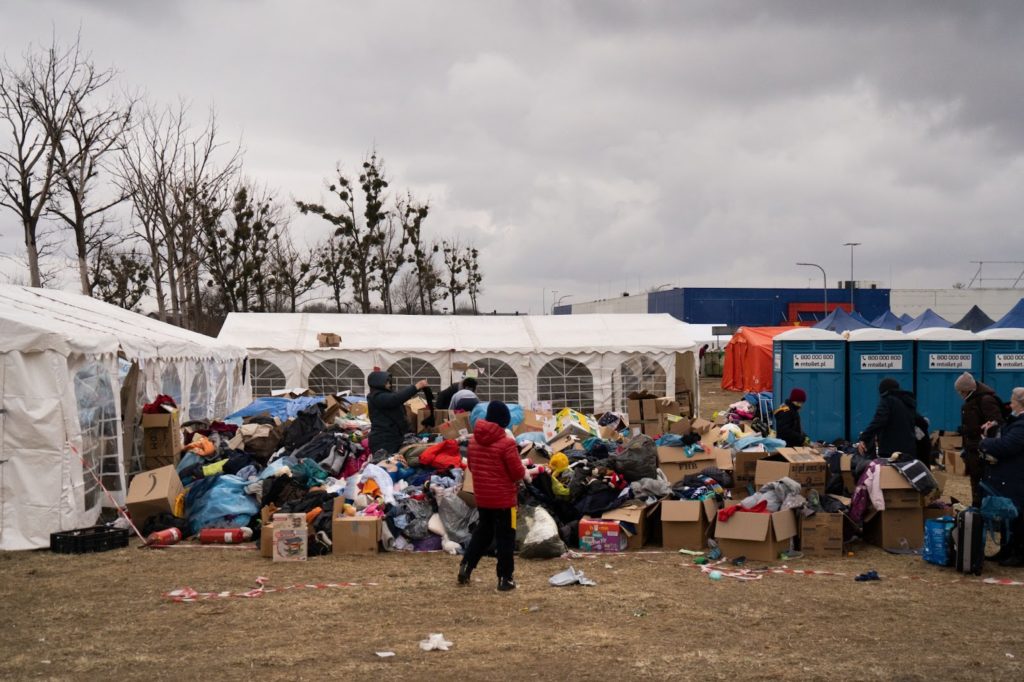 Donated winter coats and other clothing in at Przemyśl, PolandTrain Station. Photo: Ryan Flaukner-Hogg
Donated winter coats and other clothing in at Przemyśl, PolandTrain Station. Photo: Ryan Flaukner-HoggThe most disorderly sight is a growing mounting pile of winter coats, boots and other clothing donated by townsfolk. Volunteers say the cloth, leather and zippers weigh several tons. For people who fled with nothing but their clothes – and sometimes not even a winter coat – the generosity is a practical welcoming to safety and warmth.
Back at the main train station, a Polish coordinator shouts at me: “Hey, I think some of the people are hungry in here.” He wants me to distribute food.
Makeshift dormitory in the at Przemyśl, PolandTrain Station. Photo: Ryan Faulkner-Hogg
This room, in the East Wing of the train station, is filled with 100 beds arranged side by side. Toys aplenty are strewn across the floor along with empty pizza boxes.
That the people of Przemyśl efficiently help the flood of Ukrainian refugees illustrates the past. Przemyśl is a trading post built alongside the San, a navigable river. The surrounding land ofders easy passage from the rich soils of Ukraine west into Poland.
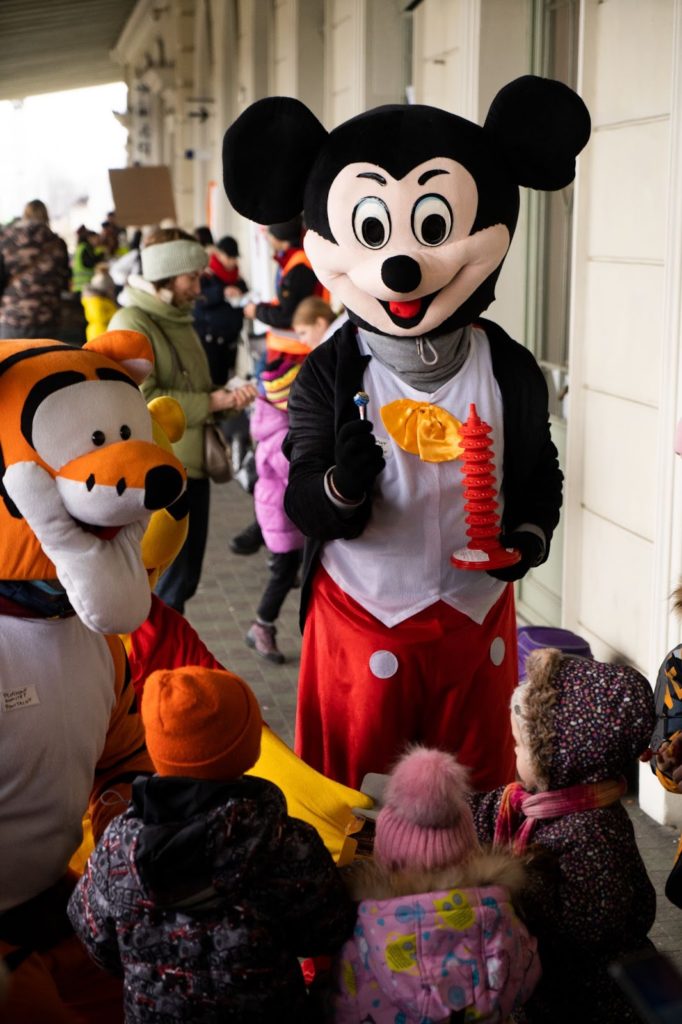 Locals in costume entertain Ukrainian refuge children at Przemyśl, Poland, Central Train Station. Photo: Ryan Faulkner-Hogg
Locals in costume entertain Ukrainian refuge children at Przemyśl, Poland, Central Train Station. Photo: Ryan Faulkner-HoggDealing with war and helping refugees is a long tradition in Przemyśl, a picturesque town of 60,000 people whose forebears have been invaded again and again for 100s of years.
A History of Defiance
The city is about 70% Catholic (Roman and Eastern) and nearly 30% Jewish. Nuns, their habits visible under their coats, seem to be everywhere helping direct people, comforting children and elderly. Adults in animal costumes wander about trying to coax a smile or even a laugh out of tykes.
During the Holocaust, the Nazis martyred 586 Przemyśl Poles for sheltering Jews.
Around the main train station, Przemyśl is beautiful. The town center is vivid, narrow, gorgeous, with winding roads, awe-inspiring cathedrals and planning from an era before cars and asphalt took priority.
Venture into the handful of streets that make up the old town, however, and you encounter a different architectural cliché: the Brutalist architecture of the old Soviet Union. The Russian communist trademark design of functionality above all else dominates. Soviet policy produced endless rows of rectangular cement block buildings with windows, each structure indistinguishable from the next.
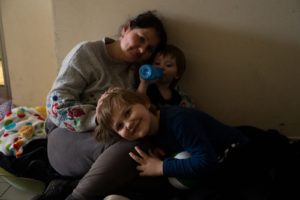 Ukrainian mother with two children in at Przemyśl, Poland.
Ukrainian mother with two children in at Przemyśl, Poland.It’s the oppressive thinking that created such eyesores that the refugees fled not knowing if they can ever go back, not knowing if the bulk of them will become widows and orphans in a foreign land.
Olga’s Story
A volunteer escort takes me to a specific family for an interview. Along the way we pass hysterical children, completely innocent of the reasons they are in this strange place so unlike home. Sobbing mothers, overwhelmed by the position they had been thrust into, sit alongside stoic grandmothers, who seem to have seen this all before. Teenagers, looking bored, scroll their thumbs on smartphones through Tik-Tok and Instagram.
Soon I reach Olga, a mother of two who doesn’t want me to use her last name. Noticing my Australian accent, she asks in her stumbling English, “What are you doing here?”
And then this: “Why are so many people giving us so much support?”
I told her that the whole world is watching that most of the world is with her, her people and her country; unambiguously on her side; angry at the invasion; and horrified by Putin’s atrocities.
Olga became overwhelmed. The whole time we spoke she verged between welling eyes and a concerned motherly gaze at her children, too young to understand.
It took Olga, her aged mother and her children three days to Przemyśl from Kyiv. A train moved relatively unimpeded to Lviv, but the rest of the journey west to safety in Poland was chaotic.
Pride and Optimism
For almost 10 hours Olga stood, mostly until they reached safety in Poland. Olga was exhausted. She said that hadn’t slept more than a few hours, hadn’t cleaned herself and worst of all hadn’t had many conversations by mobile phone with her husband who stayed behind.
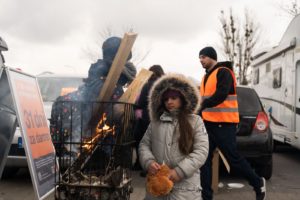 Refugee girl from Ukraine, with stuff animal, seeks warmth from a scrap wood fire near at Przemyśl, Poland.
Refugee girl from Ukraine, with stuff animal, seeks warmth from a scrap wood fire near at Przemyśl, Poland.Then she declared, swelling with optimistic pride, that her husband was fighting the Russians and winning.
He’s scrubbing the numbers from buildings and removing street signs to confuse the Russians, Olga said. That will slow the invaders because “everything they have is old, even their maps are old. They haven’t gotten new maps since the Soviet Union. Without the street signs, their maps will be useless.”
Whether that’s her wish or reality about maps issued to Russian soldiers, many other refugees share that belief.
Soon Olga volunteered her opinion of Putin. His attack was unprovoked. “He will go to hell… he’s a murderer.”
Reprinted with permission from DCReport











